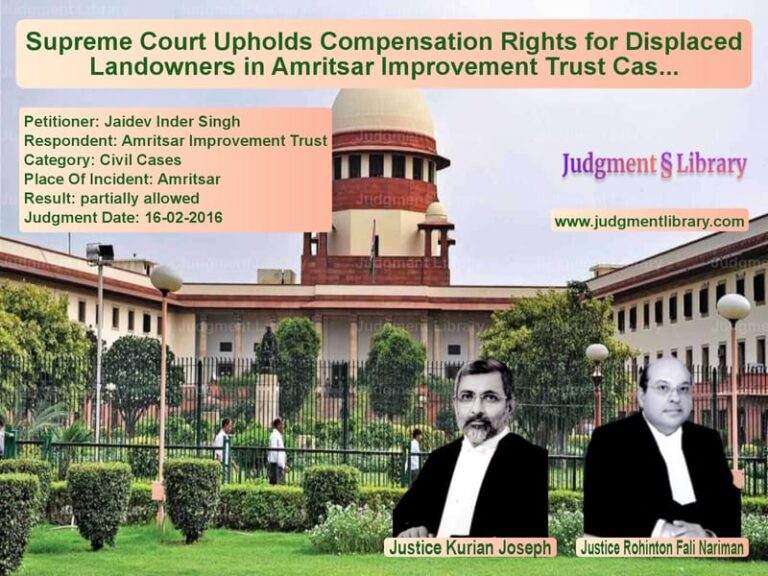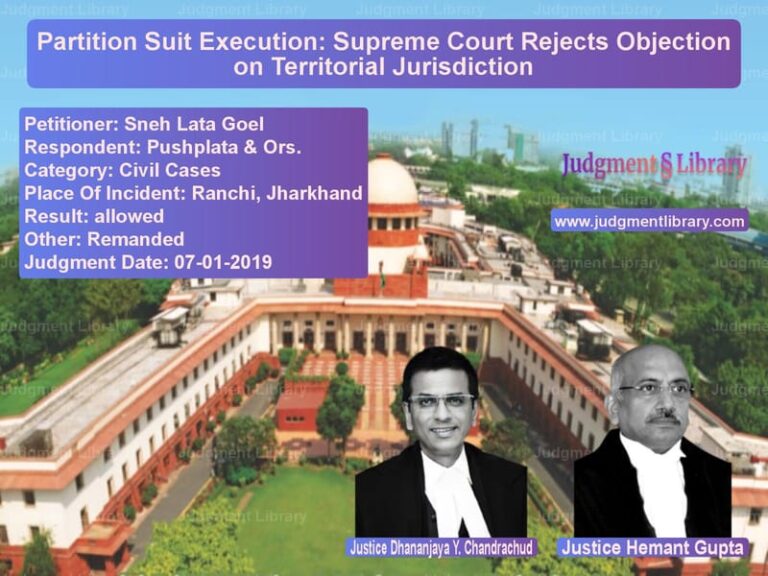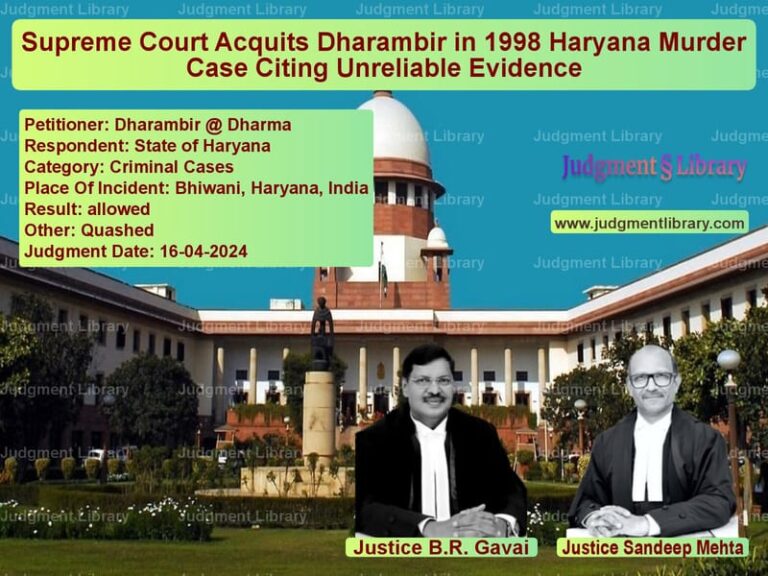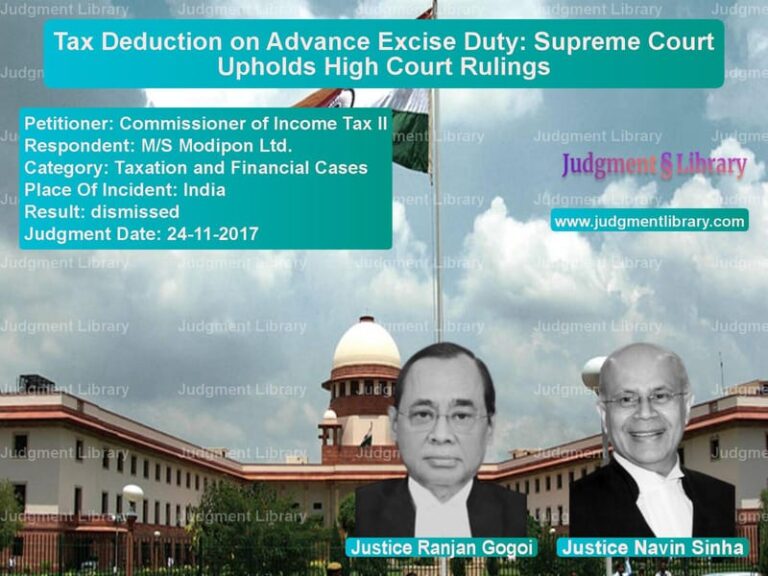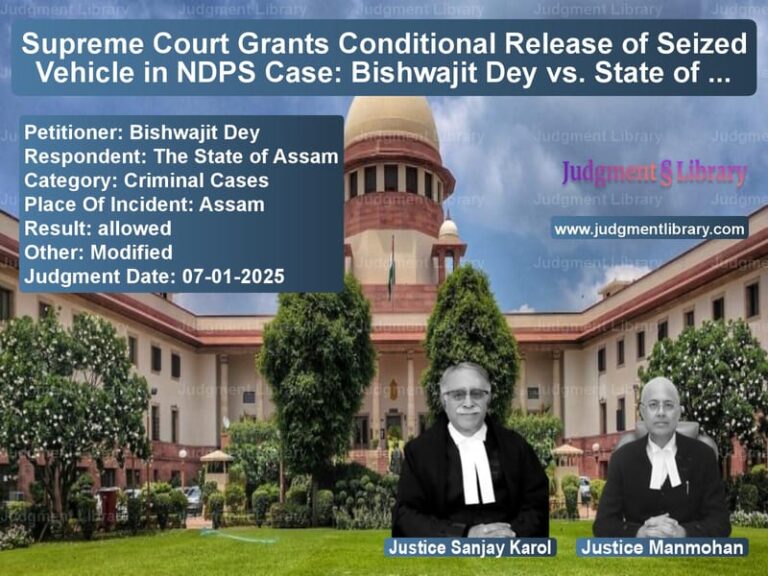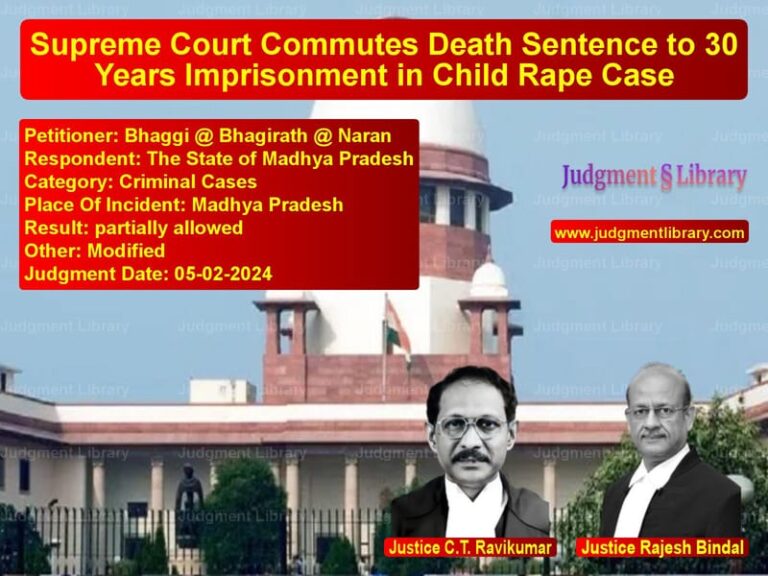Supreme Court Denies Specific Performance in Property Dispute Due to Delay and Forged Documents
The Supreme Court of India has ruled against enforcing a property sale agreement due to a significant delay by the buyers and allegations of forged documentation. The case involved a dispute over a 1990 agreement for the sale of property, where the buyers failed to make full payment within the agreed six-month period and later attempted to enforce the sale after a delay of several years.
Background of the Case
The appellants, Alagammal and others, had entered into an agreement on November 22, 1990, to sell their property to the respondents, Ganesan and Magudeeswari, for Rs. 21,000. An advance of Rs. 3,000 was paid, and the balance was to be cleared within six months. However, the respondents allegedly failed to complete the payment on time. Subsequently, the appellants sold the property to a third party on November 5, 1997.
The respondents issued a legal notice on November 18, 1997, demanding execution of the sale deed. When the appellants refused, the respondents filed Original Suit No. 165 of 1998 for specific performance. The trial court dismissed the suit, but the appellate court and the Madras High Court ruled in favor of the respondents, prompting the appellants to approach the Supreme Court.
Petitioners’ (Appellants’) Arguments
The appellants contended that:
- The agreement stipulated that the balance Rs. 18,000 was to be paid within six months, which the respondents failed to do.
- The alleged subsequent payments were not proven, and a forensic expert found that the thumb impressions on the receipts did not match the seller’s.
- The agreement clearly stated that if the buyers defaulted, the advance would be forfeited, and the sale would not proceed.
- The legal notice issued by the respondents in 1997 was an attempt to revive a dead cause.
- The suit for specific performance was time-barred under Article 54 of the Limitation Act, as it was filed in 1998, well beyond the three-year limitation period.
Respondents’ (Buyers’) Arguments
The respondents argued that:
- They had made payments beyond the stipulated six-month period, and the sellers had accepted them, thus extending the contract.
- The sellers were not in possession of the property due to a legal dispute, which prevented execution of the sale deed.
- The sale to a third party was not bona fide and was intended to defeat their claim.
- Since the property was in dispute, the limitation period should be calculated from the date of possession rather than the date of the original agreement.
Supreme Court’s Observations
The Supreme Court critically examined the evidence and made the following observations:
- The agreement clearly required full payment within six months, which was not adhered to by the buyers.
- The buyers failed to prove their alleged payments beyond the agreed timeline.
- The forensic report confirming mismatched thumb impressions raised serious doubts about the authenticity of payment receipts.
- The limitation period had expired in 1994, yet the respondents issued their legal notice only in 1997 and filed a suit in 1998.
- As per K.S. Vidyanadam v. Vairavan (1997), time is considered essential in property transactions, especially in cases involving prolonged delays.
Final Judgment
The Supreme Court set aside the High Court’s ruling and restored the trial court’s decision to dismiss the suit for specific performance. It held:
“When a buyer fails to perform their obligations within the agreed period, courts cannot grant specific performance after an unreasonable delay, particularly when the seller has already entered into another transaction.”
Key Takeaways
- Buyers must adhere to agreed payment timelines in property transactions.
- Courts will not enforce contracts where there is significant delay and no valid reason for non-compliance.
- Forensic evidence plays a crucial role in verifying disputed documents.
- The limitation period for specific performance under Article 54 of the Limitation Act is strictly enforced.
Conclusion
This ruling reinforces the principle that buyers cannot indefinitely delay their obligations and later seek enforcement of contracts. By dismissing the claim due to the lapse of time and questionable documentation, the Supreme Court has upheld the sanctity of contractual obligations in property transactions.
Petitioner Name: Alagammal & Others.Respondent Name: Ganesan & Magudeeswari.Judgment By: Justice Vikram Nath, Justice Ahsanuddin Amanullah.Place Of Incident: Tamil Nadu.Judgment Date: 10-01-2024.
Don’t miss out on the full details! Download the complete judgment in PDF format below and gain valuable insights instantly!
Download Judgment: alagammal-&-others-vs-ganesan-&-magudeeswa-supreme-court-of-india-judgment-dated-10-01-2024.pdf
Directly Download Judgment: Directly download this Judgment
See all petitions in Property Disputes
See all petitions in Specific Performance
See all petitions in Contract Disputes
See all petitions in Judgment by Vikram Nath
See all petitions in Judgment by Ahsanuddin Amanullah
See all petitions in dismissed
See all petitions in Quashed
See all petitions in supreme court of India judgments January 2024
See all petitions in 2024 judgments
See all posts in Civil Cases Category
See all allowed petitions in Civil Cases Category
See all Dismissed petitions in Civil Cases Category
See all partially allowed petitions in Civil Cases Category


